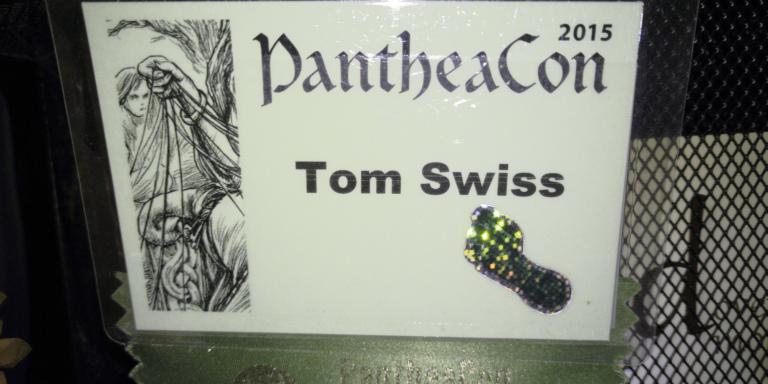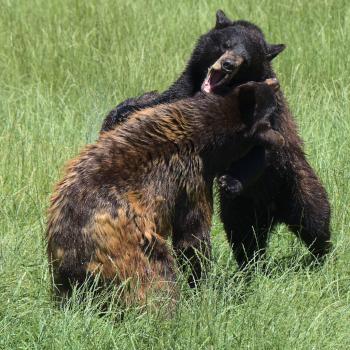The Pagan blogosphere is abuzz with the word that 2020 will be the last year for PantheaCon, one of the largest Pagan events around. Founder Glenn Turner says,
I once had a vision of the many tribes of Earth religions and neo-pagans coming together to network and share our varied views of spirituality. That vision came true for many years, but as time passed it grew bigger and the viewpoints diverged.
As as East Coast Pagan, I only made it out to PantheaCon once, in 2015. I had an excellent time (picture me now waving at some folks) and felt honored to be welcomed as a presenter. But it was also weird for me in several ways.
Part of that was that it’s the only hotel-based Pagan event I’ve made it too — what sort of Pagan festival is this without drums and dancing around a bonfire, and where I have to keep my clothes on?
But there was also an undercurrent of suspicion and censoriousness in some parts of the community — 2015 was the year of the Great PantyCon Kerfluffle, where a swipe by a satirical newsletter at a ham-fisted statement by Covenant of the Goddess had some people so “triggered” they were calling for the author to be tracked down and ejected from the conference for offending “Pagans of Color.” (The great irony being, that the author of the piece in question was a “Pagan of Color”.) After the conference I joined a PantheaCon Facebook group, but had to quit after seeing someone banned for a political disagreement. (I disagreed with their position, but it was well within the mainstream of political discourse.)
And it seems that disagreements over that sort of political correctness may have been the fatal blow to the event. That may hold a lesson for us all.
This past year, PantheaCon invited and then removed removed two presenters, Max Dashu and Witchdoctor Utu. This came after accusations against Dashu of (in the words of The Wild Hunt reporter Manny Tejeda-Moreno) “creating an unsafe environment for the trans, non-binary, and gender-nonconforming members of the community” and Utu engaging in “cultural appropriation” for daring to write about working with the spirits of Harriet Tubman and the Underground Railroad.
Let’s deal with the easy case first. “Cultural appropriation” is a null concept, and every American should want to connect to the energy of anti-slavery heroes like Harriet Tubman. (Let’s get her on the $20 bill and consign genocidal maniac Andrew Jackson to the trashbin of history already, please.) I’m proud to have done a little magic at a cairn and cross shrine that Utu helped raise at Wisteria; a few years ago I brought a bit of soil from the grounds of Camp Ramblewood’s Harriet Tubman house, an Underground Railroad stop Tubman is believed to have used, to the shrine at Wisteria. (Ramblewood is the site of the Free Spirit Gathering, my home event.)
As for Dashu, she has noteworthy credentials as a feminist historian and was a long-time presenter at PantheaCon, but has also been accused of being a “TERF”, a “Trans-Exclusionary Radical Feminist”. She has been quoted as saying some dumb things (in my assessment) about how accepting trans-women as women is a threat to the safety of cis-women — the usual absurd and ill-founded (in my assessment) complaints about letting trans-women into the ladies’ room.
I do not claim to be familiar with Dashu’s writings. From a few minutes worth of internet searches I conclude that she has said some dumb-ass transphobic things, but has also done some feminist scholarship that many people find worthy.
But let’s take a critical look at the claim that she has created an “unsafe” environment for trans and non-binary folks.
As far as I can tell she has not been accused of assaulting anyone, or of directly encouraging assaults on anyone. The claim that she has created an “unsafe” environment is based solely on ideas she has expressed and policies she has advocated. But merely expressing an idea — however stupid or vile — or advocating a policy is not an immediate threat to anyone’s safety.
I am a boring cis-het white guy, and I do not claim that my safety or rights are threatened in the same magnitude as those of trans folks, non-white folks, or gay/lesbian/bi folks. But at any large gathering there are people present who advocate ideas or policies that threaten my rights, that would be harmful to me or to people I am intimately close to.
Heck, I’ve been to a Pagan festival where a DEA employee was on staff. Shall we talk about the damage the War on Drugs has done to the world, and how many Pagan folk have been harassed, threatened, or incarcerated over the use of cannabis or psychedelics?
So how should we deal with the fact that attendees at a large event may hold values or advocate policies that others believe will be harmful to them or their loved ones? If we demand all attendees pass some sort of ideological purity test, we are going to have very small events. (Heck, if I wrote an ideological purity test today, I’m not sure I could pass it myself in a month.)
What an event can do — and should do — is set policies about behavior and about the content of presentations.
It is a good thing for an event to publicly state, for example, that attendees are expected to respect the declared and sincerely expressed gender of other attendees; that racist language will not be tolerated; that presentation topics will be vetted in part on whether they affirm the dignity of all attendees; that presenters are expected to make their presentations in a professional manner that does not interject their personal politics; and that event staff are similarly expected to behave professionally in their roles.
With such policies, someone like Dashu could still give a presentation on her theories about feminist history of Paganism and witchcraft, while being given notice that she was not being invited to publicly say dumb things about transgender people. (But also acknowledging her right to say whatever stupid things she wants to her friends in private.)
It is also vital for an event to have a conflict resolution policy which describes how these policies will be enforced. I wrote FSA’s and you’re welcome to use it as an example. (Deeper discussion of that policy is in my piece “Wild Naked Pagans and How to Host Them” in Christine Hoff Kraemer and Yvonne Aburrow’s Pagan Consent Culture: Building Communities of Empathy and Autonomy.)
The Pagan community is growing more diverse. This is a good thing! But it means that we will come into disagreement more often, and so must have policies and norms in place as to how to handle conflicts.














